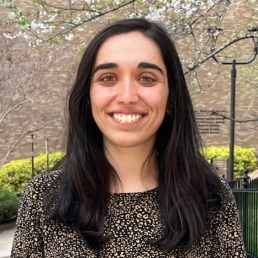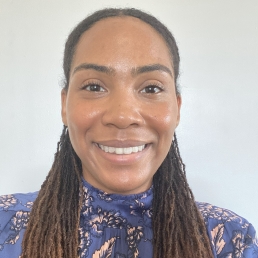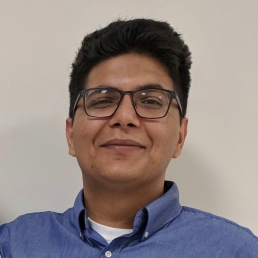JHU Environmental influences on Child Health Outcomes (ECHO) Data Analysis Center (DAC) Personnel


Core Team

Tanya Alderete

Shivani Bakre



Mohamad Burjak



Jocelyn Jingsha Chen
Giehae Choi

Marie Churchill









Jasmine Douglas


Taylor Etzel

Garrett Fuselier

Yan Huang

Kristin Hunt

Benjamin Huynh


Pragyan Khanal




Andrew Law Hua

Anna Lettieri


Xuan Li

Jiayin Liu

Rae MacGinty


Kristen McArthur






Meredith Palmore

Aaliyah Philippe-Auguste





Anna Ross

Rose Schrott






Sudhi Upadhyaya



Cara Wychgram

Xiaoshuang Xun

Haozuo Zhao
Post-Doc Fellows

Daniel Beene
Daniel is a health and medical geographer and Geographic Information (GI) scientist trained in geospatial data science and modeling, as well as critical geographical methods. Daniel earned his PhD from the University of New Mexico in 2024. His research primarily focuses on rural health and using GIScience methods to critically evaluate spatial datasets related to populations and health.

Shilan Li
Shilan Li is a postdoctoral fellow in the Department of Biostatistics at Johns Hopkins Bloomberg School of Public Health. She earned her Doctor of Science degree in Biostatistics from Georgetown University in 2023, with a dissertation focused on microbiome network analysis and distribution theory. Currently, she works with Dr. Ni Zhao and Dr. Justine Debelius on the analysis of microbiome data for the Environmental Influences on Child Health Outcomes (ECHO) project.
Students and Trainees

Krystin Jones
Krystin Jones is a fourth-year doctoral candidate in the Department of Epidemiology, specializing in genetic epidemiology. Her research focuses on the influence of maternal stress on offspring neurodevelopment, with a particular emphasis on epigenetics as a potential underlying mechanism for this association.
Prior to their doctoral studies, Krystin earned a Master of Science in Global Health, where she explored ethical considerations in genetics research within resource-constrained settings. This background provides a unique perspective to her current work, bridging the gap between global health ethics and genetic research.
Krystin is a recipient of the prestigious MD-GEM research fellowship, which supports her work in this critical area of epidemiological research.

Peter Liu
Bolun (Peter) Liu is a Ph.D. student in the Department of Biostatistics at the Johns Hopkins Bloomberg School of Public Health, advised by Elizabeth Stuart and Elizabeth Ogburn. He received his Bachelor of Science degree in Statistics with minor in Mathematics from University of Washington in 2022. Bolun is broadly interested in social network analysis, Bayesian statistics, and casual inference. He works as a Graduate Research Assistant in the ECHO Generalizability Working Group.

Yisi Liu
Yisi Liu is a current PhD student in Epidemiology of Johns Hopkins Bloomberg School of Public Health. She worked as senior research data manager at BEAD core of school of medicine before she joined ECHO. She is familiar with large dataset manipulation and data management in healthcare area data with expertise in STATA and R programming, along with Redcap dataset management and construction. She enjoys investigating data to unveil information for improving healthcare of people, and her research interest focus on the association between maternal exposures and childhood neurodevelopment.

Jayati Sharma
Past students

Jackie Lopez
Jackie Lopez was a MHS student in the Department of Epidemiology, specializing in the G.E.M track, at the Johns Hopkins Bloomberg School of Public Health. She received her Bachelor of Science degree in International Health from Bethel University in 2022. Her research interests revolve around the social determinants of health and health disparities. She has worked as a Graduate Research Assistant and conducted her master's thesis under the guidance of Drs. Amii Kress and Heather McKay.

Nandita Somayaji
Nandita Somayaji was an MHS student in the Department of Epidemiology at the Johns Hopkins Bloomberg School of Public Health. She received her Bachelor of Science in Public Health-Global Health with a minor in Political Science at the University of Washington, and her Master of Education specializing in Special Education at National University. As a former educator, Nandita is interested in exploring how social issues (e.g., gun violence, poverty, racism) impact health outcomes (e.g., behavioral and mental health) among children and adolescents across the United States.

Emma X. Yu
Emma X. Yu was a Ph.D. student in Environmental Epidemiology in the Department of Epidemiology at the Johns Hopkins Bloomberg School of Public Health. Emma received her Bachelor in Medicine degree from Fudan University and MPH degree from Emory University. Emma is interested in how prenatal exposures to chemicals (e.g., metals) may influence neurodevelopment outcomes (e.g., autism spectrum disorder) among young children.

Angela D'Adamo
Angela D’Adamo was a MHS student in the Department of Epidemiology at the Johns Hopkins Bloomberg School of Public Health. She received her Bachelor of Science degree in Public Health from Rutgers University in 2022. Her research interests focus on how social and environmental factors (e.g., race and SES) influence health inequities, specifically among urban populations and areas affected by residential segregation. Angela worked as a Graduate Research Assistant and conducted her master’s thesis with Drs. Amii Kress and Emily Knapp.

Tiange Liu
Tiange Liu was a Ph.D. student in the Department of Epidemiology at the Johns Hopkins Bloomberg School of Public Health (BSPH). She was a Research Assistant at the ECHO DAC in 2018 during her master’s at the BSPH. Tiange is now a member of the ECHO DAC Microbiome Team. Tiange is interested in perinatal, pediatric, and environmental epidemiology. She is particularly drawn to the theory of the developmental origins of health and disease. Her master’s research examined how heavy metals and trace minerals contributed to the risk of cardiovascular complications during pregnancy. Tiange has expanded her interest to the microbiome and is investigating the role of microbiome in maternal and child health for her doctoral dissertation.

Ronel Ghidey
Ronel Ghidey was an MHS candidate in the Department of Epidemiology at JHSPH. He had been serving as a data analyst under Drs. Knapp and Chandran on a project addressing the effects of county structural racism on asthma incidence. Ronel is interested in how different social conditions lead to health disparities in marginalized communities, especially housing, racism, and education."

Dr. Kuiper
As a postdoctoral fellow, Dr. Kuiper was the primary biostatistician for Potential Big Wins EC0361: Assessing exposures to novel chemicals among pregnant women in ECHO: a pilot to inform studies of associations with child health outcomes and EC0361a: Assessing exposures to aromatic amines, melamine, and cyanuric acid among pregnant women in ECHO: a pilot to inform studies of associations with child health outcomes. He also authored two publications describing methods for accounting for urinary dilution when evaluating urinary biomarkers for epidemiologic research.

Mo Li
Mo Li was a postdoctoral research fellow in the Department of Biostatistics at Johns Hopkins Bloomberg School of Public Health. His research focused on the development and application of the statistical methodology for human microbiome sequencing data. He is currently involved in the study of developing a statistical modeling approach to characterize the microbial abundances and bacteria community structure with robustly correcting the biases introduced through the experimental and analysis pipelines.

Mingyu Zhang
Mingyu Zhang was a Ph.D. candidate in the Department of Epidemiology at the Johns Hopkins Bloomberg School of Public Health (BSPH). He had been serving as a Biostatistician at the ECHO DAC since 2018. Mingyu received his bachelor's degrees from Peking University and master's degree from BPSH. Mingyu is interested in the environmental pathobiology of cardiometabolic diseases. His work focuses on understanding how early life environmental exposures (e.g., ambient air pollutants, PFAS, and metals) may shape disease risks and influence cardiometabolic health across the life span. His work has been covered by mainstream media outlets including The Washington Post, The New York Times, and Reuters and has been cited by guidelines, including those of the World Health Organization and the American Public Health Association.
Yongqi Zhong
Yongqi Zhong was a postdoctoral fellow who was conducting analyses on cohort consortium data holds several major methodological challenges, including cohort-level missing data and cohort heterogeneity due to the differences between cohorts in the same consortium. My works were to address these issues by developing and applying state-of-the-art epidemiologic methods. First, we developed a two-stage machine learning approach to assess the similarity between cohorts with disparate information. This algorithm allows investigators to identify cohorts with the same joint multivariate distribution of pertinent variables so that they could use this information to address cohort-level missingness (e.g., multiple imputations within the same joint distribution). Second, after data harmonization, across-cohort heterogeneity can be a major challenge when using data sourced from different studies, with a key question being when it is appropriate to combine cohorts for a specific research question, and when they are too different for reliable combining. We defined a novel framework of cohort heterogeneity in the context of consort consortia. This framework highlights a new field for detecting and resolving cohort-heterogeneity with respect to the diverse goals of epidemiologic studies. My methodological works facilitate the mission of ECHO DAC for better understanding of child health using novel and rigorous approaches.

Ananya Bhaktaram
Ananya Bhaktaram was an MHS candidate in the Department of Health, Behavior, and Society at JHSPH. She served as a Graduate Research Assistant under Drs. Emily Knapp and Amii Kress on the ECHO project, where they have been exploring existing measures of socioeconomic status and trying to apply them to children. Based on their review they are thinking of actually creating their own index to control for socioeconomic status. Then they will use that index to map it against ECHOs data in order to longitudinally compare socioeconomic status over time and space across the ECHO cohorts, and hopefully make some recommendations for other researchers who would like to control for socioeconomic status spatially

Jianan Lu
Jianan Lu is was master candidate in the Department of Epidemiology at the Johns Hopkins Bloomberg School of Public Health (BSPH). She joined ECHO as a research assistant since June, 2022. Jianan received her bachelor’s degree from Soochow University majoring in public health. She is mostly interested in cardiovascular diseases in the elderly groups and metabolic disorders in pediatric. Her work focuses on preventing childhood overweight/obese and prevent early onset of hypertension and coronary heart disease in early adulthood.

Yijun Li
Yijun Li was a PhD candidate in the Genetic Epidemiology program at JHSPH. Her research interests focus on integrating multi-omics data collected from epidemiologic studies to understand the early-life origins of childhood asthma. She lead a study using data collected by the ECHO program to identify DNA methylation changes at birth that are associated with development of asthma at school-age. Before she joined the PhD program, She was an ECHO biostatistician and worked on several ECHO projects including a study to evaluate the effects of maternal education and neighborhood-level socioeconomic status on gestational age at birth.

Jonathan Lewis
Jonathan Lewis was pursuing an ScM in Epidemiology at the Johns Hopkins Bloomberg School of Public Health. His interests include environmental exposures, water, sanitation and hygiene, and maternal and child health. Jonathan is assisting with incorporating novel epidemiologic and geospatial methods into ECHO analyses. He worked on blending ECHO data with public water quality data for future research projects. Jonathan received his bachelor’s degree in Public Health Science from the University of Maryland. His master's thesis is published and available here!

Yingan (Lianne) Chen
Yingan (Lianne) Chen was an MHS program student at the Bloomberg School of Public Health in the Department of Epidemiology. She worked with Dr. Kress on maternal health and microbiome, scoping review focused on methods for combining and harmonizing microbiome dataset.
